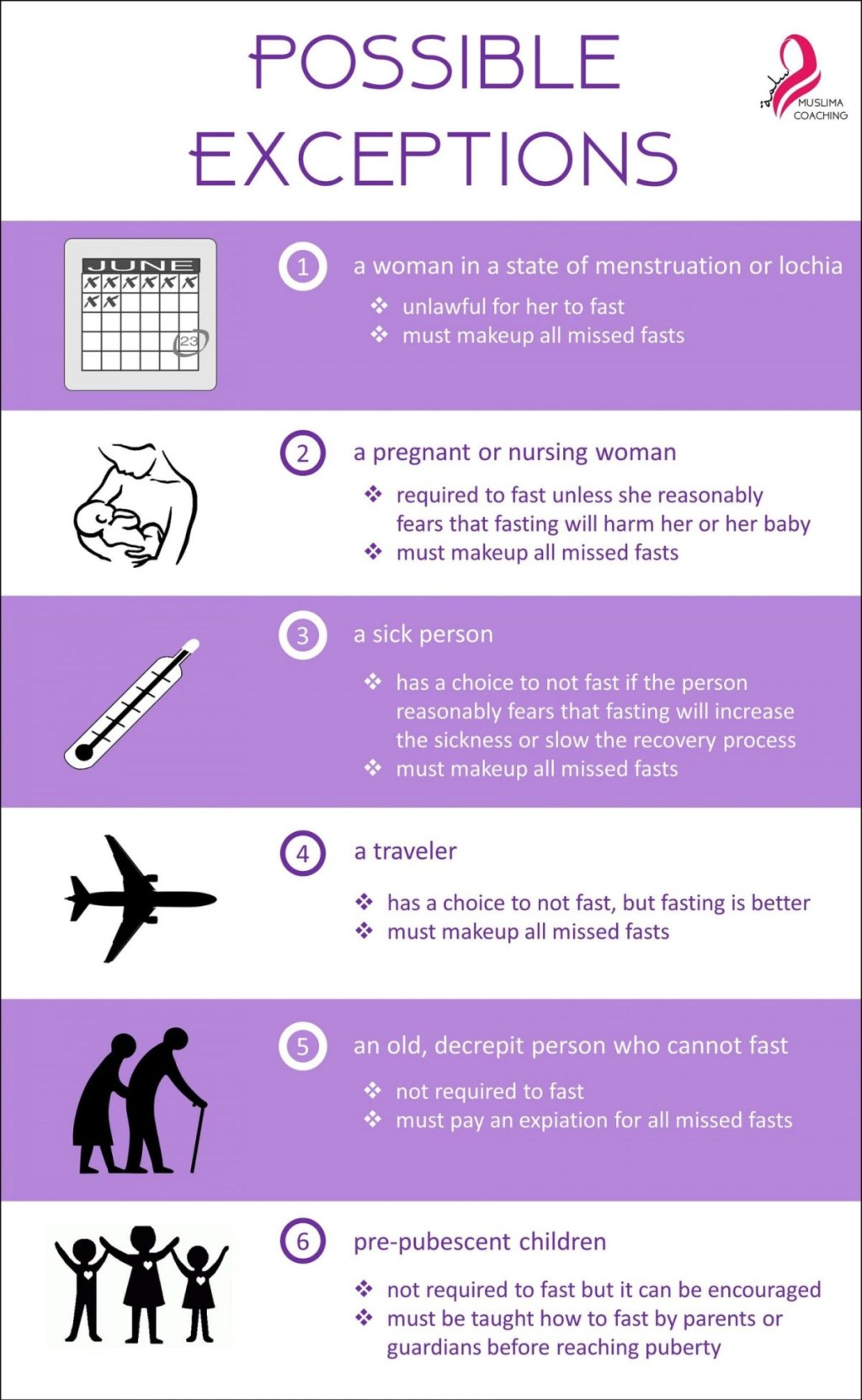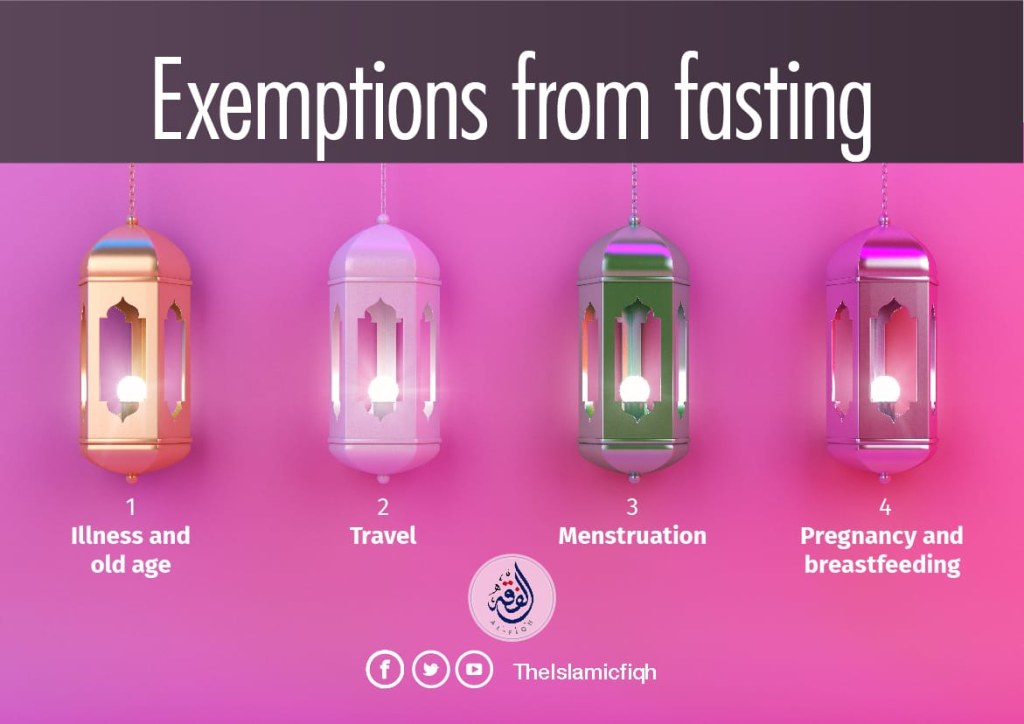Unlocking Exemptions From Ramadan Fasting: Your Ultimate Guide To Balancing Faith And Well-being
Exemptions from Ramadan Fasting
Greetings, Ramadhan enthusiasts! As we approach the holy month of Ramadan, it is important to understand the exemptions from fasting that are granted to certain individuals. While fasting from dawn to sunset is a religious obligation for most Muslims, there are circumstances and conditions that exempt individuals from this practice. In this article, we will explore the various exemptions from Ramadan fasting, providing you with a comprehensive understanding of this topic.
Introduction
In Islam, fasting during Ramadan is considered one of the Five Pillars of Islam. It is a time when Muslims abstain from food, drink, smoking, and other physical needs during daylight hours. However, there are exceptions to this practice. Let’s dive into the details of exemptions from Ramadan fasting.
3 Picture Gallery: Unlocking Exemptions From Ramadan Fasting: Your Ultimate Guide To Balancing Faith And Well-being



1. What is Ramadan fasting? 🌙

Image Source: ing.org
Ramadan fasting is the act of abstaining from food, drink, smoking, and other physical needs from dawn to sunset during the holy month of Ramadan. It is a time of self-reflection, increased devotion, and worship for Muslims around the world.
2. Who is exempted from Ramadan fasting? 🤷
There are certain categories of people who are exempted from fasting during Ramadan. These include children, pregnant and breastfeeding women, travelers, the elderly, individuals with health conditions, and women menstruating or experiencing postnatal bleeding.

Image Source: i0.wp.com
3. When are individuals exempted from Ramadan fasting? 🗓️
The exemptions from Ramadan fasting apply to individuals who are unable to fulfill the physical requirements of fasting due to valid reasons. This includes individuals who are ill, pregnant, traveling, breastfeeding, elderly, menstruating, or experiencing postnatal bleeding.
4. Where are individuals exempted from Ramadan fasting? 🌍

Image Source: islamicfiqh.net
Exemptions from Ramadan fasting apply to Muslims worldwide, regardless of their geographical location. The principles and guidelines for exemptions are universally applicable to all Muslims observing Ramadan.
5. Why are individuals exempted from Ramadan fasting? ❓
The exemptions from Ramadan fasting are based on the principle of mercy and understanding in Islam. These exemptions acknowledge that individuals may have circumstances or conditions that prevent them from fulfilling the physical requirements of fasting.
6. How are individuals exempted from Ramadan fasting? ❗
Individuals who are exempted from Ramadan fasting are required to make up the missed fasts at a later time, if possible. They can also choose to compensate by feeding the poor or making a charitable donation. The specific actions to be taken may vary depending on the individual’s situation and the guidance of their religious authorities.
Advantages and Disadvantages of Exemptions from Ramadan Fasting
1. Advantages of exemptions from Ramadan fasting ✔️
– Offers flexibility for individuals with health conditions or other circumstances that prevent them from fasting
– Allows pregnant and breastfeeding women to prioritize their health and the well-being of their child
– Considers the unique needs of travelers who may face challenges in fasting while on the move
– Respects the physical limitations of the elderly and ensures their well-being during the holy month
– Recognizes the natural biological processes of menstruating women and those experiencing postnatal bleeding
2. Disadvantages of exemptions from Ramadan fasting ❌
– May lead to misunderstandings or misconceptions about individuals who are exempted from fasting
– Can create social pressure or judgment towards those who are unable to fast due to valid reasons
– Requires individuals to make up missed fasts or compensate through other means, which may be challenging for some
– May result in feelings of guilt or exclusion for those who are unable to participate fully in the fasting experience
– Possibility of individuals abusing the exemptions for personal convenience without valid reasons
Frequently Asked Questions (FAQs)
1. Can individuals who are exempted from Ramadan fasting still participate in other religious activities?
Yes, individuals who are exempted from fasting can still participate in other religious activities, such as attending prayers, reciting the Quran, and engaging in acts of charity and kindness.
2. Are pregnant women required to abstain from fasting for the entire duration of their pregnancy?
No, pregnant women are not required to fast if it poses a risk to their health or the health of their unborn child. They should consult with their healthcare provider and religious authorities for guidance.
3. Can individuals who are exempted from fasting eat and drink openly in front of those who are fasting?
While it is considerate to be mindful of those who are fasting, individuals who are exempted from fasting are not required to hide their consumption of food and drink. However, it is important to be respectful and sensitive to the fasting individuals’ experience.
4. Can individuals with chronic health conditions be exempted from fasting during Ramadan?
Yes, individuals with chronic health conditions that make fasting detrimental to their well-being can be exempted from fasting. They should consult with their healthcare provider and religious authorities for guidance on alternative ways to fulfill their religious obligations.
5. What are the alternatives for individuals who are exempted from fasting?
Individuals who are exempted from fasting can make up the missed fasts at a later time when their circumstances allow. They can also choose to feed the poor or make a charitable donation as a form of compensation.
Conclusion
In conclusion, exemptions from Ramadan fasting allow individuals with valid reasons to fulfill their religious obligations while considering their physical well-being and unique circumstances. It is important to respect and support those who are exempted from fasting, fostering an inclusive and understanding environment within the Muslim community.
We hope this article has provided you with a comprehensive understanding of exemptions from Ramadan fasting. May the holy month of Ramadan bring blessings and spiritual reflection to all. Ramadan Mubarak!
Note: The content of this article is for informational purposes only and should not replace professional medical or religious advice.
This post topic: Ramadhan

